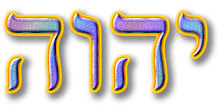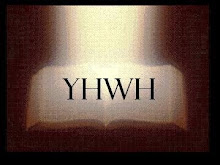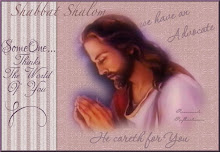24 ADAR,5769 Sixth Day Yom Ha'shee'shee
The magic of Passover is not the magic of Easter? How can this be? I am sure by now, anyone who is reading this blog or knows me, knows that Easter is a pagan celebration. While Christians celebrate Easter Sunday as The LORD's Resurrection, it is also steeped in pagan lore.
The Easter bunny who brings eggs? Is this the magic? It would seem so because even with the day asigned to be a memorial to Yeshua's resurrection, churches everywhere celebrate the bunny too. Having Easter egg hunts and giving out Easter baskets to the children who come that day is the norm.
I remember one Easter, my husband said no baskets and candy for our kids. Now, let me make this clear, he was not doing so for religious reasons, he was being mean. I think he was needing a car part or something stupid so decided to take it out on the kids and me. Oh I fretted and was extremely grateful when the kids and I went to church and they were given baskets.
But, now knowing the truth, we do not have Easter baskets here....but there is tradition of giving children candy and treats on Sabbath to celebrate Passover. It was a custom to grab a handful of fresh grass and give the candy and treats in it. In some way, this was combined with the pagan and Christian day of Easter.
There is also the eating of boiled eggs during the Passover seder...but it has nothing to do with the pagan.
There is 'magic' in Passover....if you want to call it magic and it is far greater than Easter......
Yeshua is our Passover! In 1 Corinthians 5:7&8, Paul rebuked the church at Cornith...."Therefore cleanse out the old leaven, so that you are a new lump , as you are unleavened. For also Messiah our Passover was offered for us. So then let us observe the festival, not with old leaven, nor with the leaven of evil and wickedness, but with the unleavened bread of sincerity and truth."
It is clear that Yeshua is so identified with the Passover Feast of Israel that He is called the Messiah of Passover.
The eating of Matzah during Unleavened Bread is to rid ones self of all leaven. In the beginning, God told the children of Israel to take their bread as it was, not risen, when they fled from Egypt....but through the ages, it became the yearly ritual of cleaning ones house, thouroughly and getting rid of every bit of leaven. We know this to be a Spiritual command....get rid of the sin in your life.
And, let us not forget the placing of the three Matzah into a bag during the Passover Seder. There has been no adequate explanation for this, but we, who know the LORD, can 'see' and 'understand' its meaning.
A bag with three compartments is used. One piece of matzah is placed in each of the compartments. These three matzahs have come to be referred to as .."the unity" by rabbis. The father or the one who is conducting the seder, reaches in to the bag but skips over the top, going instead to the middle section and removes it. He breaks this in two and wraps half in a linen cloth and places it in another bag labeled, 'afikomen'. The wrapped broken matzah is hidden.
Later, the matzah is found, and this coincides with the pouring of the third cup of Passover wine, the cup of redemption.
We, who are Believers, see the three matzah as representing the unity of the Godhead...Father, Son and Holy Spirit. The broken matzah represents Yeshua, the Messiah. This ceremony presents a picture of the birth, death and resurrection of the One who came to bring redemption to Israel and salvation to the nations.
Let us look at this closer....the very nature of the matzah points to the nature of Messiah. Since matzah is unleavened and leavening is symbolic of sin in the Scriptures, the matzah protrays the holy nature of Messiah Yeshua, Who was born without sin and lived a sinless life.
As the middle matzah is removed from the three-in-one unity bag, so Messiah became flesh in order to be upon this earth. as the matzah is broken, so too was His flesh broken by the whipping, the nailing to the cross and the piercing of the sword in His flesh. As the broken piese is wrapped in white cloth, so was His body prepared for burial in a tomb. as the piece is called afikomen (the one who comes again), so Yeshua rose from the dead to complete His mission of redemtion, and, of course, He will come again to establish His kingdom. As the Passover cup of redemption is deeply drank along with the eating of a piece of the broken matzah, so too are we invited to drink deeply of Messiah's gift to us.....eternal life.
(Some of this infromation is from Chosen Peoples Publications)
As you read the following, understand it is written from the Jewish point of view. They have seen Passover as their redemption from Egypt and looked to it as the coming of the Messsiah. They cry out to Him. We must pray that this Passover, they come to understand that Yeshua is their Passover lamb and through Him they can receive eternal life..being 'passed over' once and for all.
TAKING THE MAGIC BACK
by Yael Zoldan
When springtime comes I begin scowling at the insides of closets and the undersides of beds. “Pesach is coming,” I mutter to myself and sigh.
“Pesach is coming,” I repeat, “and I have more work than one human being could possibly do.” Then I sigh again, theatrically.
I don’t even notice my son, listening, until I hear him say, “Well, at least we’re not in Mitzrayim anymore, right, Mommy?”
I stare at him for a moment, ashamed of what he has heard. Pesach is coming and I have entirely missed the point.
Back when I was his age, before I knew about cleaning and cooking and shopping, Pesach was a wondrous time. The house was scrubbed spotless and the once-a-year dishes came out. The silver was polished so brightly that I could see my reflection upside down in the spoons. In the kitchen waited lady fingers and nut cakes and chocolates and meringues. At the table, my handmade Haggada could finally come out of its plastic bag and my mother’s finger pointed to the place. I shivered with excitement.
The Seder was magical. Staying up late, eating with the grown ups, all eyes on my face as I sang the Ma Nishtana. For once, no one was annoyed by my constant questions. No one shushed me, or whispered, “Later!” For once, every question was important, every answer well thought out. I drank from a silver becher, like my Abba, like my Zaidy. I dipped my pinky into grape juice ten times and no one stopped me! Even when I spilled, leaning against my pillowcase, no one really minded.
My father was regal in his kittel. “Ha Lachma Anya,” he intoned and I felt a chill run down my spine. How many fathers for how many years had said these same words? How many children had sat just like me, wide-eyed with wonder and listened. And the story! There were heroes and villains, kings and slaves. My mind whirled with the magic of it all.
The maror on my matzah was sharp and bitter. I knew it would be because I had stood beside my father as he grated it by hand into a bowl. He wore goggles and still the tears streamed down his face. But at the Seder he always gave me twice as much charoses as maror, and winked as he passed it down.
Then we ate hot chicken soup and flanken and kugels. And I could hardly swallow waiting for the Afikomen. What joy! What awesome power in the hands of an eight year old girl! To ask for anything you wanted, anything! Sometimes, I got so excited I couldn’t think a single thing to ask for. And besides, what more could I want than this moment and this night?
But the best part was Shfoch Chamoscha. I’d take a deep breath and pull open the door. Outside, the night was black as pitch and silent. But I thought I felt a breeze as Eliyahu Hanavi entered. “Baruch Haba!” we called out and watched the wine shimmer in his cup.
By then, my eyes were closing and I leaned heavily on my mother’s shoulder. “L’Shana Haba Biyerushalayim” we sang and Shoin! Shoin! Shoin! We banged our fists on the table with such authority that I knew Moshiach would listen and he would come. Tonight!
How lucky I felt to be a Jew on Seder nights! To know that the story had happened for me. The frogs, and the lice and the darkness and the fury of Hashem raining down on their heads just so I could sit here tonight, in my maroon velvet robe, and ask the questions and hear the answers. Just so I could hear how the bad guys got punished and the good guys got saved and we lived to tell the story and wait for Moshiach to redeem us again.
But morning came and he did not. And years have passed and still he has not come. And I got busy with the drudgery of moving the fridge and lining the drawers and scrubbing the stove. When did I stop waiting? When did I stop wanting? Somewhere along the way, I forgot the point. I lost the magic.
Now I look down at my son’s soft eyes and it all comes back. He is right and I have been so wrong. It isn’t about the stove, it’s about the story. It’s about the miracle and the magic. So, this year I resolve, I will stop sighing. I will come to the table wide eyed again and listen to the tale that is made new every year by our children and their questions and our faith in the answers.
This year, I’m taking the magic back.
Subscribe to:
Post Comments (Atom)











No comments:
Post a Comment